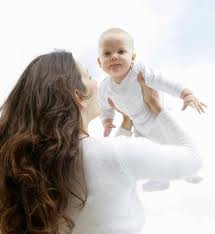When will my hair stop shedding? Guide to Postpartum Hair Loss
Do you ever find yourself asking the question – “when will my hair stop shedding?” Increased shedding or hair loss, often occurring a few months after delivery, is a common postpartum condition known as telogen effluvium or telogen gravidarum, and
results from a disturbance in the normal hair growth cycle.
This condition affects 40-50% of new mothers, this is a temporary condition that will usually correct itself within 6-12 months postpartum. Temporary or not, hair loss is often met with a significant amount of emotional distress and anxiety for women.
Who Doesn’t Love Hormones?

During pregnancy, a rise in hormones – specifically estrogen – prevents you from losing your hair by binding to local estrogen receptors on the hair follicles, which effects their growth and normal cycling. After pregnancy, your hormones return to normal levels, putting your body in a hypo-estrogen state. This causes you to lose your hair as the normal hair growth-shedding cycle is restored.
Hair loss or shedding in the months following delivery may also be associated with other conditions that change hormonal levels in the body.
Thyroid function – Hair loss is closely related to thyroid hormone levels (i.e. hyper/hypothyroid). It important to speak to your health care provider about testing your thyroid hormone levels if you feel like this may be a contributing factor.
Excess androgens – Natural steroids produced by the adrenal glands and ovaries that act like male hormones within the body. Higher levels of androgens are commonly associated with conditions like polycystic ovarian syndrome (PCOS), acne, weight gain, and hirsuitism, and can promote increased hair shedding and loss.
Breastfeeding – Increased prolactin levels associated with breastfeeding can also lead to an increase in shedding and hair loss.
Stress – Physiological stressors like surgical trauma, postpartum hemorrhage, or high fever can result in increased levels of cortisol in the body and can lead to hair loss.
Birth Control – Changing or stopping the birth control pill can also lead to a drop in the sex hormones – estrogen and progesterone – thereby contributing to hair loss.

Supplement your diet with the following nutrients:
- Vitamin B complex
- Biotin (Possibly safe; orally and appropriately)
- Vitamin C
- Vitamin E (Likely safe if amount does not exceed the RDA; possibly safe if it does)
- Zinc (Likely safe when used orally and appropriately; likely unsafe when used orally in high doses)
Contact the Kasia Hair and Skin Health Specialist today! We provide safe, effective and "beautiful health" alternatives for optimal beauty. We also specialize in hair loss - and will walk the journey with you.......
Reference: Kristi Prince